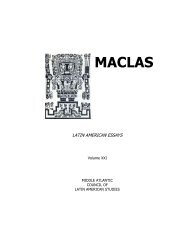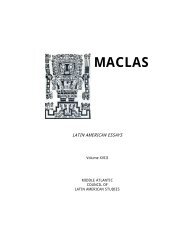latin american essays maclas
latin american essays maclas
latin american essays maclas
Create successful ePaper yourself
Turn your PDF publications into a flip-book with our unique Google optimized e-Paper software.
epeatedly, ad nauseam: in the garden, at the mall, at the beach; eating, talking,<br />
dancing, laughing (fortunately not doing other more private things!). . . . A<br />
proliferation of images that made her feel trapped, fragmented, invaded” (128-<br />
129). Estela’s discomfort is subconsciously absorbed by Gina and turned into a<br />
nightmare in which she becomes a character trapped in her own movie called<br />
The Pinos Verdes Wife:<br />
The Pinos Verdes Wife, TAKE 53. She’s sitting alone in a theater<br />
watching a movie when, suddenly, she realizes the movie is about her.<br />
The screen has become a crystal ball where Gina’s life is unfolding.<br />
“Who the hell did this to me!” she screams within the walls of her<br />
subconscious. “Who turned me into a character!” . . .<br />
She’s helpless, unable to break frame, unable to do<br />
anything but watch, having to face the onslaught of events with no<br />
recourse and no power. There are some good moments, but few<br />
compared to the long stretches of boredom and domesticity that await<br />
her. What about her career Like, does she have an exciting job It<br />
doesn’t show up on this screen! Her professional world has been cut out<br />
of the final print, scraps on the floor of some dusty editing room.<br />
Rejects.<br />
“Get me out of here!” she wails . . . Through the distorted lens<br />
of her dream, she has turned into a Pinos Verdes Wife. Gina Domingo is<br />
Mrs. Robert Holmes. Worse: she sounds and acts and talks just like her<br />
mother! “Fire the screenwriter!” Gina cries out . . . (129)<br />
Dreams and nightmares, presented as imagined films, are frequent in the<br />
novel, and they contribute to the layering effect of represented reality. They also<br />
give depth to Gina’s psychological struggles. Estella’s reaction to being filmed<br />
triggers in Gina a questioning stance towards her own assumptions about what<br />
constitutes reality or, the “Truth.”<br />
The Computer<br />
The computer is also an important part of Gina’s life. In it, she keeps her<br />
files with names such as “You,” “Cartas,” and “Family”: “Her machine kept up<br />
with the images that ran through her head. It did it all so fast! Using this<br />
computer was like talking to herself, only better. . . . But the most amazing thing<br />
about this hardware was that it allowed Gina to keep a record of her life, of who<br />
she was. The real “You,” magically stored in files and hidden. Saved” (58). The<br />
computer, as well as all the other gadgets, help the insecure Gina hold on to<br />
images and words that ground her sense of self in recognizable, fixed elements<br />
that she can control.<br />
116




